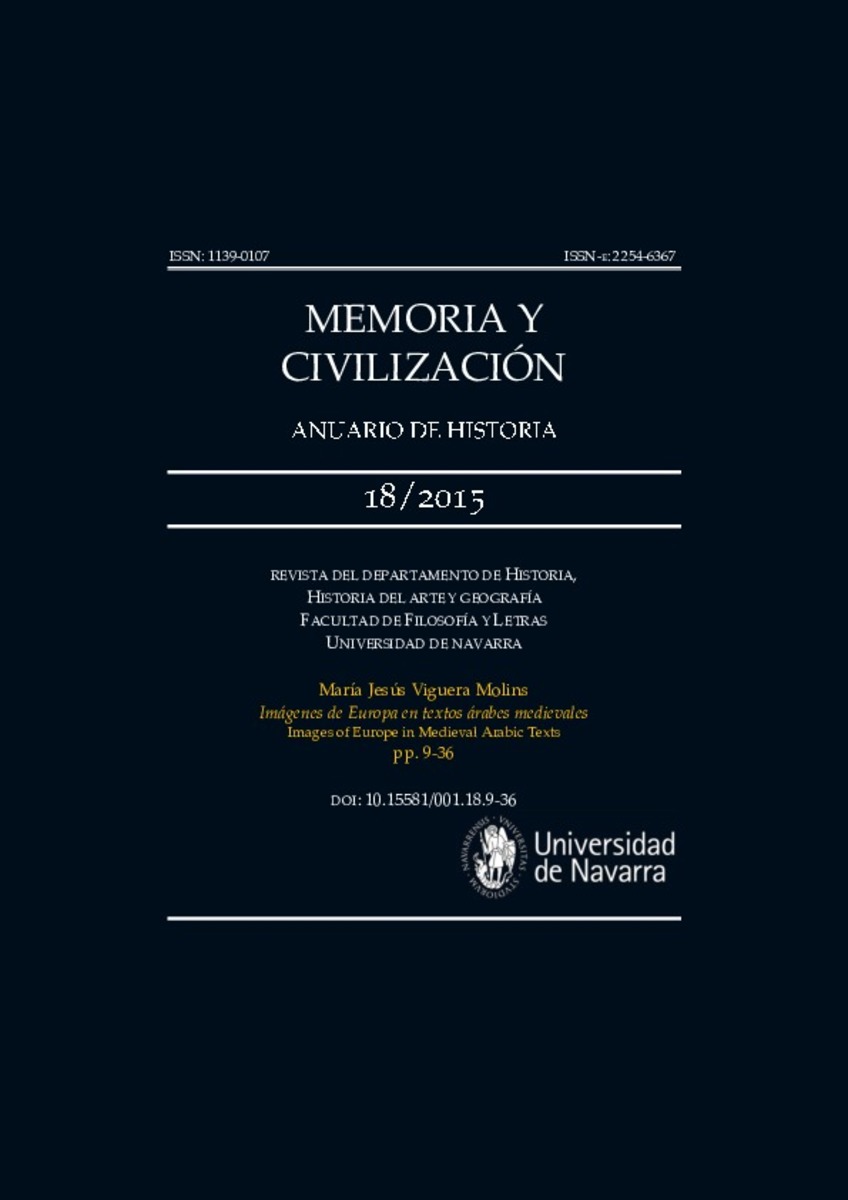Full metadata record
| DC Field | Value | Language |
|---|---|---|
| dc.creator | Viguera-Molins, M.J. (María Jesús) | - |
| dc.date.accessioned | 2016-02-16T17:17:16Z | - |
| dc.date.available | 2016-02-16T17:17:16Z | - |
| dc.date.issued | 2015 | - |
| dc.identifier.citation | Viguera-Molins, María Jesús.""Imágenes de Europa en textos árabes medievales"", Vol. 18 (2015): 9-36 | es_ES |
| dc.identifier.issn | 1139-0107 | - |
| dc.identifier.uri | https://hdl.handle.net/10171/39934 | - |
| dc.description.abstract | Diversos tipos de fuentes textuales árabes, escritas durante la Edad Media, ofrecen referencias sobre territorios y gentes de Europa, a través de conocimientos transmitidos desde la antigüedad, combinados con datos medievales actualizados por viajeros, geógrafos y cronistas. Es un tema amplio e intenso, pues abarca las noticias y representaciones producidas a partir de intereses surgidos entre espacios contiguos, separados y a la vez conectados por fronteras terrestres y marítimas, exteriores e internas, a través de contactos de todo tipo que comenza-ron, directamente, con la expansión islámica hacia Bizancio y hasta Occidente, desde el siglo VIII. Las imágenes así elaboradas por escrito, desde el siglo IX, se acumularon en las visiones y sensaciones del ámbito arabo-islámico medie-val, por la habitual persistencia de las memorias tradicionales, que recurren a estereotipos sobre el Otro fundamentalmente marcados por pre-juicios y hostilidades, a veces superados por la proximidad de intereses y contactos comercia-les y culturales. | es_ES |
| dc.description.abstract | Different kinds of Arabic textual sources, written during the Middle Ages, pro-vide references about territories and peoples from Europe, using information transferred since Ancient times, combined with medieval data updated by travelers, geographers and chroni-clers. It is a wide and intense subject, as it co-vers the news and images produced from inter-est earned between spaces contiguous, separat-ed and at the same time connected by land and sea, external and internal, borders through contacts of all kinds that began directly with the Islamic expansion into Byzantium and up to West, from the 8th century. These images thus prepared in writing, since the 9th century, ac-cumulated in visions and sensations of the Arabic-Islamic medieval world, due to the usual continuation of traditional memories, resorting to stereotypes about the other, fundamentally marked by prejudices and hostilities, and some-times overcomed by close interests and com-mercial and cultural contacts. | es_ES |
| dc.language.iso | spa | es_ES |
| dc.publisher | Servicio de publicaciones Universidad de Navarra | es_ES |
| dc.rights | info:eu-repo/semantics/openAccess | es_ES |
| dc.subject | Imágenes | es_ES |
| dc.subject | Contactos | es_ES |
| dc.subject | Europa | es_ES |
| dc.subject | Edad Media | es_ES |
| dc.subject | Textos árabes | es_ES |
| dc.subject | Materias Investigacion::Historia::Historia | es_ES |
| dc.subject | Images | es_ES |
| dc.subject | Contacts | es_ES |
| dc.subject | Europe | es_ES |
| dc.subject | Middle Ages | es_ES |
| dc.subject | Arab texts | es_ES |
| dc.title | Imágenes de Europa en textos árabes medievales | es_ES |
| dc.type | info:eu-repo/semantics/article | es_ES |
| dc.identifier.doi | 10.15581/001.18.9-36 | es_ES |
Files in This Item:
Statistics and impact
Items in Dadun are protected by copyright, with all rights reserved, unless otherwise indicated.






